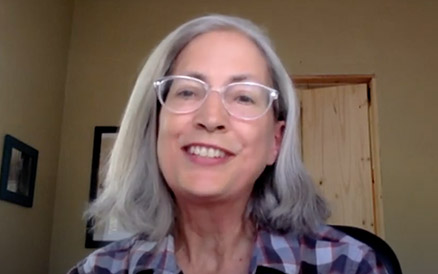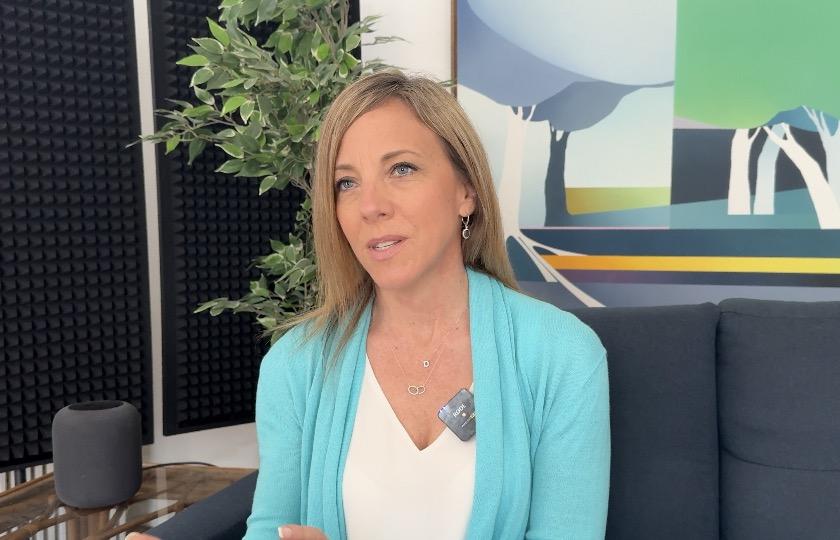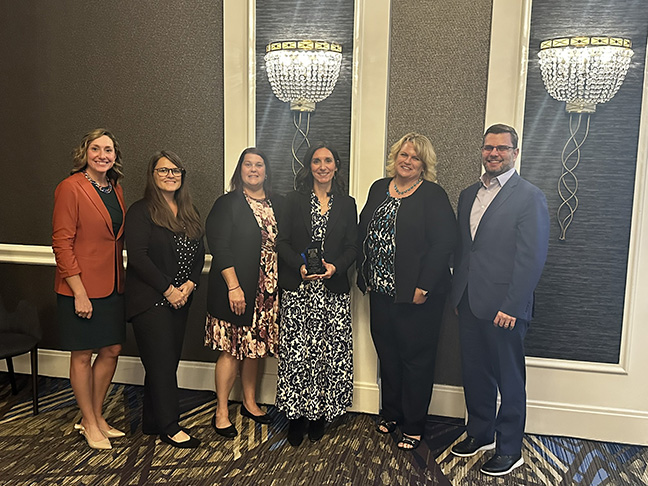Do you find yourself doing a lot of numbing out lately? If you’re not familiar, “numbing out” is a practical term used in the wellness community to describe a practice that we all probably do from time to time as a way of coping with every-day life stressors.
A typical example of “numbing out” says Jamie Frees Miller, a local Fertility and Family Wellness Coach at A Nourishing Path, is when we’re stressed from the day’s events and attempt to practice self-care by clicking on Netflix and escaping into a program that serves as a diversion or escape from the “real world”.

Frees Miller
While self-care is definitely encouraged as a positive modality for the modern world, Frees Miller says the diversional approach does nothing beneficial for us in return, and offered some insights for and alternatives to the stressors that seem to be coming at us from every direction right now.
Frees Miller’s background and education in anthropology and cultural studies provides a solid foundation and primer for her work as a fertility and wellness coach, as she sees the biological connection between nature and how humans evolved as key to understanding how to treat today’s threats to health and well-being.
“I think there’s a real disconnect between our modern environment and how we biologically evolved. That’s the anthropology part of my perspective of health coaching,” Frees Miller explains. “So, when I’m coaching someone, I’m really looking at how do we get back to the basics of what it means to be human and how do we handle the modern stressors of our daily lives? Stress for me is about 50 percent of healing. If you don’t address the stress part, it’s probably not going to be possible to fully heal.”
She notes that there are three key aspects of our physiology, which include our limbic system, our parasympathetic nervous system, and the function of our vagal nerve, that can be most impacted by stress.
The upside, or good news, says Frees Miller, is found in our human ability to adapt.
“The brain is really neuroplastic. It can be retrained. You can rewire neurons. I like to tell people when we get in those negative spirals of stress, anxiety, depression—that’s the part that we want to retrain. We want to be able to help our bodies become aware of what’s happening.”
This, she says, is one piece of the larger physiological puzzle, associated with the body’s limbic system, or the part of our brain that regulates behavior and emotional responses.
This is where the practice of mindfulness or taking that moment to be present and check in with the self is so beneficial, so we can be more aware of what’s actually going on internally when we’re in these patterns.
In turn, this practice, says Frees Miller, enhances our ability to choose and create the life that we actually desire. So, if we’re stressed and just numbing out to the TV, we’re missing the opportunity to create longer lasting and better outcomes for ourselves.
Stress can also impact the optimal health of our parasympathetic nervous systems. When we are in stress mode, we are compromising this part of our nervous system which is responsible for our bodies maintaining homeostasis and regulating various bodily functions, including digestion, heart rate and blood pressure, immune responses, mood, and more.
“Most people have heard of fight or flight, that’s the sympathetic response,” she explains. “Then there’s the parasympathetic response, which is the rest and digest. In order to actually digest our food and get true restorative rest that the body needs to heal, we need to be able to get back into parasympathetic response.”
In addition to working with a wellness coach to ensure that your body and mind is adapting to stress as it should, Frees Miller recommends healthy doses of physical activities and mindful practices that you don’t need an appointment for. Easily accessible literature and information on topics and practices, she says, can be found on apps such as Calm and Insight Timer, which are great sources for guided meditation practices, and websites such as the Primal Trust Academy & Community at primaltrust.org, that provide guidance for limbic system work.
Most often in this space, yoga and meditation are among the first practices that are mentioned and recommended with annals of cited beneficial data to back up both, but Frees Miller says there’s so much more out there.
In her own life, she says, there was a time when she found yoga to be the most beneficial and practical activity for helping to maintain optimal health. She says she tried meditation, as well, but struggled, as many do, to achieve the meditative state. She says you need not engage in just the most popular practices to experience results and encouraged other modalities.
Currently, Frees Miller, gains substantive benefit from a series of breathing exercises she practices regularly.
“I find that my brain doesn’t shut off enough for me to feel like I’m in a meditative state. Whereas the breath work program I’m going through is more along the lines of you don’t have to shut off your brain,” says Frees Miller.
“All you do is you sit with your thoughts and acknowledge them, and you set an intention before you breathe. And so, when thoughts come up, you think along the lines of how does this thought relate to my intention? So ( in this practice) there’s intention-setting, a 15-minute breath session, and then a debrief.”
This particular breathwork program, she says, involves a deep level of unwinding of nervous system stress responses and is best done under the guidance of a breathwork practitioner or coach.
“I often work with a coach who can help me reflect and go deeper on how it relates to my intention,” she says of the practice which she learned from a program called The Reconnected Parenting Course. The “debriefing” for her involves journaling to reflect on what thoughts and physical sensations occurred during her session.
“But I often work with a coach who can help me reflect and go deeper on how it relates to my intention.”
She also pointed to practices such as forest bathing and therapeutic massage that can add depth and variety to your plan to address stress.
“When I think about nervous system work, it’s really about thinking of safety. How do we make our body feel the most safe? And going back to the anthropology piece and how we evolved in nature.”
Frees Miller often reminds people that just spending time in nature is beneficial and a way of going back to our roots as humans.
Mary Hardcastle, a local forest therapist and novelist with an MFA in Interdisciplinary Arts, agrees. Like Frees Miller, Hardcastle is a member of the broader Chestertown Wellness Collective.

Mary Hardcastle
“Mental distress can often make us feel overwhelmed and isolated because our perspective becomes limited to our own thoughts and we lose touch with a broader view of the world,” says Hardcastle. Forest bathing, she adds, does two very important things for us.
“It allows us to access our five senses, breathe in beneficial plant biochemicals, and practice mindfulness in a peaceful environment.”
She explains that these effects not only help us relieve stressful thoughts, but being in nature reassures us that there is a wide world beyond ourselves, beyond the human-made world, where life goes on as plants are growing, birds are flying, and we can see the vast sky above us.
“We can connect to this bigger flow of life because we are nature, too.”
The physical piece of any nervous system work, Frees Miller says, is grounded in the function of our vagus nerve. The vagus, or cranial nerve, also regulates many essential physical functions including our breathing, the muscles involved in our ability to speak, the way our body reacts to inflammation, our taste transmitters, and so much more.
There are a variety of vagal toning techniques such as deep breathing exercises, cold water immersion therapies, meditation, and even singing and humming, that can be employed to stimulate the vagus nerve.
Massage therapy has also be identified as a therapeutic approach to vagal toning. In addition to the calming, immediate effects a good massage has on the body and mind, benefits are also gleaned from incorporating the practice on a regular basis to temper stress.
For those who suffer from stress-induced sleep issues, sessions with a certified massage therapist can help in obvious and even some not so obvious ways.
“The body is always attempting to heal itself through the process of sleep,” says John Hudson, a licensed massage therapist based in Chestertown.
“A good massage can be comparable to getting two nights of good sleep.”
Hudson says he works regularly with clients who feel that therapeutic massage is an essential part of their overall approach to addressing the effects that stress and everyday life has on them. Oftentimes the practice results in improved sleep, which is important for healing.
“Most people who haven’t had one, don’t understand the value of having a massage,” says Hudson. However, once committed to the practice as part of their health and wellness approach, many clients say they can’t imagine not doing it.
“While you’re having the massage, you’re really having the opportunity to check in with yourself,” says Amy Brown, a greater Chestertown resident and client of Hudson’s.
“It may be relaxing or something like that, but it may also be that you’ve got this kink here or there.”
For Brown, who owns and works on an organic farm with her husband, this practice which she has been participating in for at least 20 years, has been a part of what she sees as an invaluable aspect of her approach to good health.
A long-time practitioner of Pilates, Brown feels massage was a way to get more deeply into her indispensable muscles and joints on the therapeutic side.
“But the other thing I know, is that it really does relax me. It really does loosen up where I tighten up because of my anatomy. I deal with stress in different ways than some people do, but it does get manifested in my body.”
Brown feels, in her life, massage is the most efficient way to release that stress.
A good read on the matter, says Frees Miller, is “Assessing the Healing Power of the Vagus Nerve” by Stanley Rosenberg.
“There’s a bunch of exercises in the back of that book. So, it’s a relatively affordable way people can start working on their nervous system on a structural and vagal toning level.”
Whatever specific therapies you choose, Frees Miller says, its wise not to wait until you’re actually feeling stressed out to treat it.
“Carve out a space in your everyday life for stress relief, because it’s not necessarily like when your stressed there’s something you need to fix, and you can just whip a tool out of a bag and fix it on the spot. With a careful, mindful daily approach, our entire being benefits as the daily stressors occur.”
She adds we should take heart in the fact that there are many options out there and that the best ones are going to be different from person to person. The key is to choose something that you know that you will be able to do only a daily basis, but one that does not involve “numbing out”.
“I don’t look at health as a destination. It’s going to be a continuous journey. So, there’s always room to continue to improve your health.”
For more about Chestertown Wellness Collective, go here.





